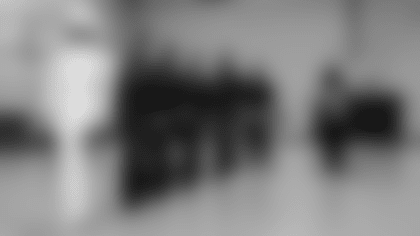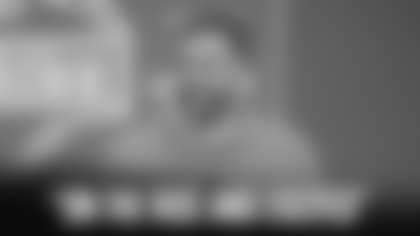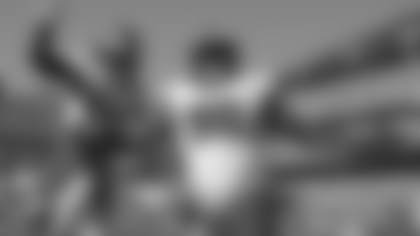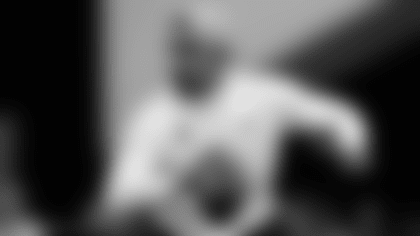Q. Can you talk about WR Jeremy Maclin and your perspective on his journey back from injury?
PAT SHURMUR: Yeah, he's the Ed Block Courage Award winner, and certainly coming back from injury is hard enough, and playing a skill position like he plays is even harder. And I think he's done a tremendous job. He's really battled through it. We obviously work with him on a day-to-day basis, and there's some struggles when you come back physically and then mentally, emotionally, as you're trying to get yourself back. We're hopeful that we see performances much like he had Sunday as we go forward.
Q. How impressed were you by his toughness on Sunday? PAT SHURMUR: Certainly when he got knocked out [of the game], he displayed a great deal of toughness. Some of the routes that he ran -- He was running fast the whole night and he was challenging against some pretty good corners. It was a great performance, and sort of what we expect from him.
Q. How is G/T Todd Herremans doing? PAT SHURMUR: He's doing fine. He was in and out of the game the other night. He should be out [practicing] today.
Q. When C Jason Kelce and G Evan Mathis come back, do you expect them to be able to do things like before they did before the injuries?
PAT SHURMUR: I think it takes a little bit of time to work back in there. You're certainly working on the things you need to do individually and then getting back working in a group. But those guys are pros. They're veterans. They understand how to deal with injuries, coming back from injuries, and I think that group works really well together. So it will be a shorter period of time than it could be for some.
Q. Do you look at WR Josh Huff's performance like a learning experience for him considering some of the things that happened during the game?
PAT SHURMUR: Well, there were some obvious things that didn't go well for Josh, certainly. But he battled in there. He blocked extremely well. Really when you're a young player, every experience out here on the field is a learning experience. That's why young players tend to get better. You see great jumps of improvement where veteran players you see smaller jumps in improvement because everything is new to them. But he battled through it. He handled the adversity well. Nobody wants to fumble, trust me. Nobody goes out there when they carry the ball, and tries to [fumble]. Now there are things we can learn and certainly we can't do that.
Q. How do you defend a guy like Texans DE J.J. Watt?
PAT SHURMUR: Well, he's very hard. He's certainly a guy that can wreck the game and he's proven it. He's taken interceptions back for touchdowns. He's a very difficult guy to block. He's going to be a tough challenge for our guys. And it's not like you can double him because he shows up all over the place; he's on the right, he's on the left, he's in the middle. I heard an interview at one point where I think that's part of their scheme, but then there's also a little bit of randomness in it that he can do, as well. Q. In the booth on Sunday, what kind of look did you get on RB Chris Polk's run at the end of the game in the fourth quarter?
PAT SHURMUR: We saw what everybody else saw. First of all, it was a good run, it got down in there close. We knew there was an opportunity to have a first down or not and that's why they measured it. But what we saw, we saw the elbow down. And our experience with those [situations regarding] the line to gain, is if it's not obvious they don't get overturned. And since they spotted it, they measured it, and the ball was extremely close, you're only talking about a matter of inches, and it wasn't like the ball got placed down. There was an elbow down and the ball swinging. Typically in those situations, if they'd given us the first and the Cardinals challenged, it would have been hard to go backward. Same thing can be said about us. They didn't give it to us, going forward we would have had the same result.
Q. Specifically, what feed of replays did you get? Did you get the television feed or the in-house feed?
PAT SHURMUR: Well we got some kind of feed where we could see, I'm assuming, what you all saw. We had a feed of some sort.
Q. When you coached against the Texans in the AFC, did you see this from Watt right away? Did he jump out?
PAT SHURMUR: Yeah, he was this type of player. And he's one of those guys, I think he was at central Michigan and then he ended up he was doing something. And they said, hey, it would be a pretty good idea if you come out for football and he did. That was his story in college and he's quite a story now in the NFL.
We liked him quite a bit. I was in Cleveland at the time when he was a draft eligible player and we certainly would have loved to have drafted him.
Q. T Andrew Gardner is typically a tackle. Under the normal circumstances if T Dennis Kelly was up, does Kelly jump in there?
PAT SHURMUR: Gardner was up, so he jumped in there. We're obviously pretty fluid there right now. But he went in and did a good job.
Q. What does the team do, I know the fans have a hard time getting over a game like that. What does a coach or team do to get over a bad loss like that?
PAT SHURMUR: Well, I think we all kind of admit the fact that we're disappointed that we lost. We're all in this knowing that the only way that you can get over it you can't get ill over it. You can't create mental illness over the fact that you fought hard and lost the game. We've all got to learn to take a punch once in a while.
What you do is you fly back home. You try to get a good night's sleep or as much as sleep as you can. You come in in the morning. You try to correct the mistakes and then you move on. And that's the process that we're used to. Because then we're right back into it. We don't necessarily want to listen to all the things that get talked about. Because we're still in the early parts of the week where we're giving praise and assigning blame outside the building. What we do is correct our individual mistakes and move forward as it applies to our next opponent. That's sort of how we do it.
Q. Is QB Nick Foles' turnover rate a concern for you?
PAT SHURMUR: It's a concern when we turn the ball over, certainly, certainly. I think it can be said for the interceptions and the fumbles. We didn't take advantage of getting points early in the game where nothing that happened at the end of the game would have mattered. So those are some of the errors that we need to correct.
Q. The reason I ask is it's said in the past that we can't get hung on 27-2. At what point does the current rate become too much?
PAT SHURMUR: Well, we've got to correct the errors that we make in terms of turning the ball over, and again there's a reason for it. And we're just going to have to just continue to try to improve it, and I think that's really it.
Q. Nick is throwing off his back foot more than he did last year
PAT SHURMUR: What I'm finding with Nick is when he sets his feet and steps into the throws he's awesome. What we're also finding is there are times when he gets flushed or he flushes himself and he doesn't have his feet underneath him and he's not as good as he could be if they were, and I think that can be said for all quarterbacks.
I remember a game when Tom Brady was playing against the Chiefs and he didn't look so great. And everybody was wondering when he was going to retire. Now they're 4 0 since that time.
So quarterbacks are constantly working on that. And there are plenty of plays that were excellent in the game. He scrambled once and hit Coop [WR Riley Cooper]. We were trying to throw a screen and go to the left and he reset and he had a guy all over him and he fired a ball down the field to Mac [WR Jeremy Maclin] for a touchdown. There were good plays in there, as well. I think coach mentioned it yesterday, he's a 5 2 quarterback. We've got to continue to improve.
Q. He is flushing himself, and that doesn't seem to be changing. Is that a mental thing?
PAT SHURMUR: Yeah, but I think what happens sometimes is quarterbacks try to find a throwing lane. And so that's some of what we do. But we just ‑‑ when we do flush, we've got to remain a passer. There are times when you don't have to. Certainly, there are times that you do and those are the things that we work on.
Q. Do you see a correlation between the lack of sacks and the increase in interceptions?
PAT SHURMUR: Well, we have had a lack of sacks, which is good. There are times when you throw the ball away, there are times where you can't throw the ball away and you just get swamped, and then there are times -- they rushed us a couple of times, with only three guys -- where then now you flush, because you can't see what's coming‑‑ you flush, and then it's not there and you throw it away.
So there are times when an incomplete pass is really the right thing to do. And that's why I say it's something that we've got to look at on an individual basis. But as a passer, if you can stay in the pocket, trust the pocket, there's no reason to flush, go through your progression, as the down gets late then you start to use your feet and do the right thing with the football.
Q. Has Foles done that enough?
PAT SHURMUR: Well we practice it every day. Again, I know you can't be out here. I assure you that we do that. We practice under center, we do all that stuff.
Q. So he is trusting everything and not flushing himself?
PAT SHURMUR: I think there are plays, individual plays, that I wouldn't say ‑‑ we've just got to continue to work and if we can minimize ‑‑ if every player can minimize two or three bad plays from the game, then we're talking about why we haven't lost a game.
Q. Do you think any of that comes from residual effects of the pocket not being trustworthy early on in the season where there may have been some leaks?
PAT SHURMUR: I don't think so. I don't think so. We trust each other. Everybody trusts each other. It's not a lack of trust.
Q. On the interception that was intended for WR Josh Huff in the end zone. Was Nick late with that throw or is that one that he probably shouldn't be throwing at all?
PAT SHURMUR: We had a four-vertical concept and Huff was running up the seam. The corner, the outside player, overlapped inside and we had [TE Brent] Celek running on the outside. [Foles] slid to his left a little bit. He felt a little pressure to his right and he slid to his left. You typically don't make that throw late down the seam and he'll learn from it.
Q. You're obviously concentrating on Houston, but do you get a little bit of a lift when you see Dallas lose like they did last night? Now they have two losses.
PAT SHURMUR: You know, I was sort of indifferent. What was wild, though, is that two of the quarterbacks that we worked with in Cleveland were playing against each other: Colt McCoy and then [Brandon] Weeden for a stretch there. I got home in time to see the last part of the game. I think what I took from that game was I was glad to see Colt McCoy have success. We ground through a couple of tough years there.
The same could be said for Weeden. He came in and moved the team. I was probably more happy for Colt having success, because, you know, when you work with somebody you gain an appreciation for what they can do. Q. The decision to put Foles in the shotgun on McCoy's third-and-1 run down near the goal line. Why do you go shotgun there? Is there an advantage or a disadvantage and what's the reasoning behind it?
PAT SHURMUR: Yeah, I think ‑‑ we do a lot in the shotgun. And we'll be in the shotgun all the way up and down the field. Certainly, all the way to the inch line. So there was no real structural reason for it. I guess if you're under center, you're more likely to sneak the ball or something. We feel good about running the football, whether we're in the shotgun or under. There's nothing really there. Q. Why did that play just not work at all?
PAT SHURMUR: Well, we got penetration. We were running an inside-zone play, and we ended up getting penetration on the left side. [TE James] Casey, as you saw, skimmed back, and he put a pretty good shot on [Cardinals LB Sam] Acho there. But we got penetration inside on the left and that's sort of what kind of got us off track on our run. So that's the reason. I guess my point was whether we were under center or not, because we do run that play both ways, that wouldn't have stopped the penetration there.
Q. On the last play of the game to WR Jordan Matthews, on the right side of the field Maclin was given about 13-to-15 yards of cushion. Knowing that you guys obviously have to get into the end zone to score, does he have the luxury to break off the route and run a slant there to make it a one-on-one scenario?
PAT SHURMUR: That route concept was designed to throw the ball to the left. That was a situation there where it's an end zone situation, in other words the ball needs to be completed in the end zone. You'll remember that there was a time, in a former life here, where we've thrown those balls inbounds, and all of a sudden it's a really neat completion, you get tackled on the one, and you're like, 'Oh my God, you guys are the dumbest people in the world.' (laughter)
So that was designed where really the choices were to throw the post to Coop [Cooper] or throw the flag route to Jordan.
Q. When you watch the tape, do you think Matthews needed to leave his feet to try to get that ball?
PAT SHURMUR: Yeah, I think so. Q. In looking at the Texans, have you been able to see enough of LB Jadeveon Clowney?
PAT SHURMUR: Yeah, he's – Now you add what can be two game wreckers to the front. He played well in sort of a smaller role last week and so I'm assuming they'll give him more this week. But those are two dynamic players [Watt and Clowney]. They can rush the passer, they're hard to block when you're running the football, and if you throw the ball in and around them, they've got a lot of reach and range, where they just don't tip it down, sometimes they pick it off. They're two guys we need to be aware of.













